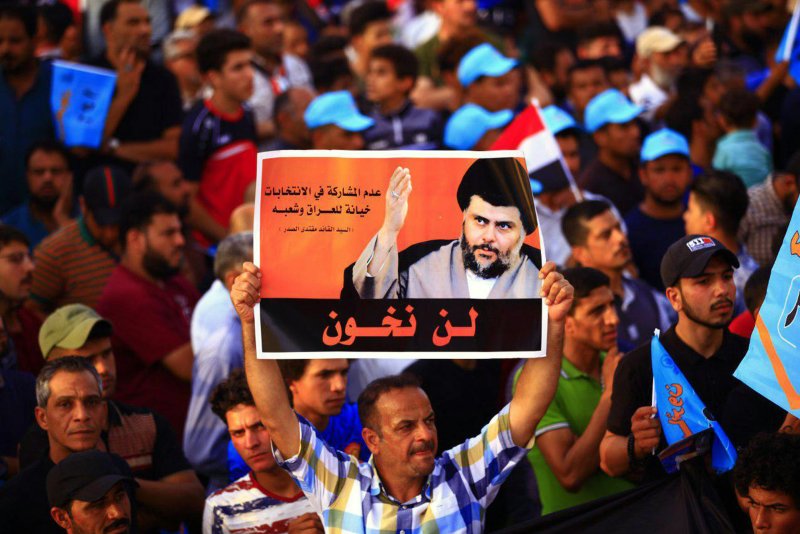A supporter holds a poster of Iraqi Shiite cleric Moqtada Sadr at a campaign rally in Tahrir Square in Baghdad. Photo by Ali Abbas/ EPA-EFE
May 15 (UPI) -- With more than 90 percent of votes counted, the coalition of Shiite leader Moqtada Sadr is set to win Iraq's parliamentary elections.
After being sidelined by Iranian-backed rivals for years, the apparent parliamentary victory marks a political comeback for Sadr, who didn't even officially run for prime minister in this year's elections.
Sadr, an opponent to both U.S. and Iranian influence in Iraq, was followed by Iran-backed Shiite militia leader Hadi al-Amiri's coalition. Incumbent Prime Minister Haider al-Abadi's coalition, initially predicted to win re-election, trails in third.
With votes coming in from 16 of Iraq's 18 provinces, Sairoon -- an alliance between the Sadrist Movement and Iraq's Communist Party -- won more than 1.3 million votes and 54 of 329 parliament seats.
Voter turnout was at a low 44 percent, 15 percent lower than the turnout in the 2014 parliamentary elections.
Rend al-Rahim, a former Iraqi ambassador to the United States, told Al Jazeera Sadr's coalition win highlights "anti-establishment sentiment and anti-corruption" as driving forces behind the choice of most voters
"Many of the lists also used populist and demagogic tactics that played on the emotions of voters," Rahim said. "The success of Sairoon and Fatah clearly show that voters were ideologically and emotionally driven."
Sadr will not become prime minister, as he wasn't on the ballot, but a victory would allow him to appoint someone to the post. The other winning blocks, though, will have to approve his nomination.
Iranian officials have already stated they will block Sadr's coalition.
No single group is expected to gain an outright majority. Despite a third-place finish, Abadi could still remain prime minister after the government coalition is formed.
The elections, held Saturday, were Iraq's first since it declared victory over the Islamic State terror group and fourth since dictator Saddam Hussein was toppled 15 years ago.















